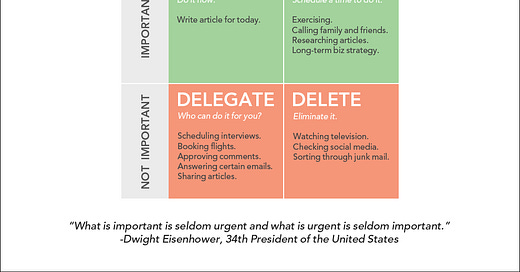Monday - Friday: Making the Most of the Work Week
Strategies to Enhance Productivity and Well-being
CONTEXT
December and the holiday season invite people to reflect on the year and start planning the next one. Looking back, for many, the workweek can usually feel like a relentless marathon. People struggle to maintain productivity and well-being from Monday to Friday, leaving them drained and unfulfilled and feeling that the weekend might not be enough to recharge.
Productivity and well-being are topics Natascha and I are very passionate about, so I really appreciated when Nick Roarty sent the Ted Radio Hour "Monday - Friday" podcast my way (full link at the end of the post) - Muchas gracias, Nick!
This post explores practical strategies to help you thrive during the workweek based on the podcast discussion. Understanding the diverse perspectives thought leaders share allows you to adopt new habits that enhance your professional performance and personal satisfaction. The goal is to help us structure a pleasant workweek moving forward.
METHODOLOGY
1. Monday: Set the Tone with Clear Goals
Setting clear intentions at the beginning of the week provides direction and focus, preventing distraction by less critical tasks. To stay motivated and on track, create a list of three to five key goals. If you need guidance, Grace Beverley's productivity planner, The Productivity Method, has nice Daily and Weekly planners (link at the end).
Practical Tip: Dedicate 15 minutes every Monday morning to list three key goals for the week. If you're working on a project, a key goal might be to complete a specific phase, such as "Finish the first draft of the marketing plan."
2. Tuesday: Prioritize Tasks with the Eisenhower Box
Prioritization is essential for effectively managing a workload. Organizing tasks by urgency and importance helps you focus on critical activities and reduces stress.
Practical Tip: Use the Eisenhower Box to categorize tasks into four quadrants: urgent and important, important but not urgent, urgent but not important, and neither. This helps systematically tackle tasks based on their proper priority.
3. Wednesday: Schedule Breaks to Boost Focus
It can be challenging to stay focused and mentally clear throughout the day. Schedule regular breaks to prevent burnout and maintain high energy levels.
Practical Tip: Implement the Pomodoro Technique, which involves working for 25 minutes and then taking a 5-minute break. Use this time to engage in light activity or mindfulness exercises to rejuvenate. I also like marking priority tasks in my calendar according to my energy levels so I can make the most of them.
4. Thursday: Foster Collaboration Through Short Meetings
Effective collaboration is key to team success and innovation. Frequent, focused communication enhances teamwork and minimizes misunderstandings.
Practical Tip: Schedule brief, focused meetings with a clear agenda to ensure efficiency. Use collaborative digital tools to facilitate communication, especially in remote settings.
5. Friday: Reflect and Recharge for the weekend
Reflection is an essential practice for continuous growth and preparation. Reviewing the week's accomplishments helps identify successes and areas for improvement.
Practical Tip: At the end of the week, spend 15 minutes journaling about your achievements and challenges. Use this time to plan for the upcoming week and set new intentions.
CLOSING THOUGHTS
Each day of the workweek presents unique opportunities to enhance productivity and well-being. By employing these daily strategies, you can turn the workweek into a structured, productive, and fulfilling experience. Inspired by insights from the "Ted Radio Hour" podcast, these simple yet effective tips emphasize the importance of planning and reflection. Adopting these practices will help you create a work environment supporting personal and professional growth, ensuring a balanced and rewarding week.
RESOURCE SHOUT OUT
https://productivitymethod.com/





